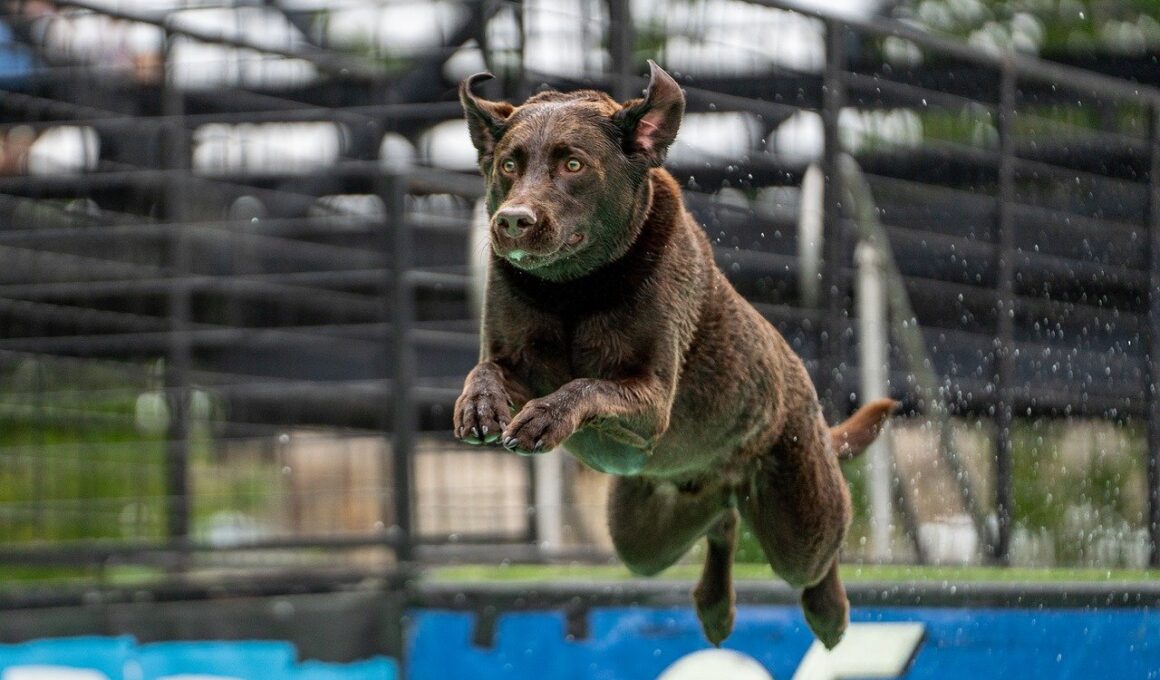Mental Challenges: The Key to a Happy, Healthy Sporting Dog
Engaging your dog in various sports not only provides them with physical exercise but simultaneously stimulates their mind. Mental challenges integrated into dog sports encourage dogs to think critically and develop problem-solving skills. This mental stimulation can greatly improve their overall behavior and focus. By participating in sports like agility or obedience trials, dogs experience various physical and cognitive tasks, which helps build confidence. As they master different challenges, dogs feel accomplished and grow closer to their owners, reinforcing the bond between them. Moreover, positive reinforcement through training and persistent practice can lead to improved attitude and eagerness to participate. Delving into dog sports introduces a fun dynamic where both owner and dog can learn together while enjoying the activity alone or with friends. Additionally, being aware of your dog’s unique personality contributes to selecting the right sport to match their needs. Ensuring they are both physically active and mentally engaged becomes pivotal not only for their well-being but establishes a productive routine enriching their lives. Consistent practice in dog sports fosters an environment of growth, balance, and fulfillment for both dog and owner.
A crucial aspect of dog sports is understanding your dog’s mental abilities. Each dog possesses unique cognitive skills that need tailored activities to keep them engaged. For example, herding breeds excel in sports that require intelligence and decision-making, while retrievers may thrive in retrieving tasks. When choosing a sport for your dog, consider their breed and individual preferences to enhance their engagement. In addition to breed characteristics, age plays a significant role in mental stimulation. For instance, younger dogs may be better suited for high-energy sports, while older dogs may prefer more strategic activities. Finding the right balance of mental challenge and physical exercise is vital for keeping your dog happy and healthy. Sports that involve teamwork, such as flyball and team agility, are also beneficial, as they teach dogs to rely on their handlers while improving their communication skills. Training sessions that incorporate both fun and challenge can strengthen the bond between dog and owner. Social interaction with other dogs during such activities further enhances their socialization skills, making them adaptable in various environments. All in all, customizing the approach fosters a fulfilling experience enriching your dog’s athletic journey.
Incorporating Play into Training
Many dog owners overlook the importance of incorporating play into training sessions. Games can serve as effective tools for reinforcing learning while keeping dogs motivated and focused. By integrating fun activities within formal training, owners can create a more enjoyable atmosphere that benefits both. For instance, using toys or treats as rewards encourages dogs to remain engaged throughout sessions while simultaneously cultivating their mental skills. Activities like hide-and-seek or fetch can be integrated into practice, promoting both mental acuity and physical exercise. Moreover, play can help alleviate stress for dogs, allowing them to process what they learn more effectively. Creating a positive mentality surrounding training transforms learning into a rewarding experience, fostering enthusiasm and eagerness from your dog. Furthermore, owner participation in these games strengthens the bond, essential for effective communication and teamwork in competitive settings. Building trust ensures your dog will look to you as a leader, enhancing their focus in challenging sports scenarios. Playful engagement prevents burnout while consistently driving progress, keeping your dog mentally fit throughout their sporting endeavors. Therefore, blending structured training with playful interaction constructs a wholesome approach to mental stimulation in dog sports.
Another vital element of mental stimulation in dog sports is the integration of problem-solving tasks. Incorporating puzzles and exercises that challenge your dog’s intellect greatly contributes to their mental fitness. Various types of puzzles are available on the market, allowing you to select the perfect challenge tailored to your dog’s skill level and interests. These puzzles often require dogs to manipulate objects or find hidden treats, motivating them to think strategically and develop their problem-solving skills further. For example, try using treat-dispensing toys that require your dog to roll or nudge them to access rewards. Gradually increasing the difficulty of these tasks enhances your dog’s cognitive abilities while keeping training fresh and exciting. Additionally, consider varying the exercises and settings to prevent routine boredom. Ensure you continuously adjust the complexity of the tasks according to your dog’s progress, enabling them to experience ongoing challenges. This incremental advancement leads to improved focus and adaptability in various sporting events. Finding new ways to engage your dog’s mind adds excitement to your training routines. Purposeful engagement fosters a deeper connection, resulting in enhanced enjoyment and achievement in dog sports. Ultimately, problem-solving tasks are a compelling way to enrich your dog’s life.
The Role of Environment
The training environment where dog sports occur can significantly impact your dog’s mental stimulation. It’s essential to create an engaging and motivating atmosphere filled with various challenges and distractions. Training dogs in diverse settings, such as parks, fields, or agility venues, encourages adaptability. Different locations also expose your dog to various sounds and sights, requiring them to think critically and assess their surroundings during training. Such experiences enhance their focus and readiness for competition, building confidence and resilience. Additionally, regularly changing the training environment cultivates problem-solving skills and adaptability. To further engage your dog’s cognitive abilities, use props and obstacles, such as cones, jumps, and tunnels, within training sessions. Introducing new visual and physical aspects keeps your dog excited and eager to perform. Also, team training scenarios foster a sense of community, allowing dogs to socialize while honing their skills. Including interaction among dogs also practices essential social cues and strengthens bonds with their human companions. Adapting various elements within your dog sports environment motivates them to think critically, ultimately leading to fruitful experiences. Overall, the environment plays a pivotal role in shaping your dog’s training journey.
Mental challenges in dog sports extend beyond merely physical exercises; they reinforce vital life skills and good behavior. Engaging dogs in sports fosters discipline, enhances obedience, and builds resilience through failures and triumphs. This understanding translates to a more balanced life, promoting overall well-being. Moreover, the mental stimulation wealth experienced through dog sports leads to reduced anxiety and behavioral issues. A well-stimulated dog is less likely to engage in destructive tendencies resulting from boredom or pent-up energy. In addition, mental engagement enriches their lives, fostering happier, healthier companions. Practicing skills learned in sports is beneficial beyond the realm of sport; these skills help dogs navigate various environments and coexist peacefully with other animals and people. Dog sports allow canines and their owners to bond over shared goals, creating deeper relationships and positive experiences. Plus, the thrill of competition excites many animals, igniting their confidence and zest for life. By steadily advancing through different challenges, you create a rewarding journey that nurtures their innate abilities. Ultimately, by prioritizing mental stimulation through sports, you contribute significantly to their happiness and longevity.
Conclusion
Mental stimulation in dog sports is an influential factor in promoting a healthy, happy lifestyle for your furry friend. Keeping your dog engaged through challenges not only fosters physical abilities but hones their mental capacities as well. Exploring diverse sporting activities allows you to tailor experiences according to your dog’s interests, leading to improved focus, discipline, and social skills. Consistently incorporating play, problem-solving, and varied environments into your training efforts cultivates well-rounded, adaptable sporting dogs. This commitment significantly impacts their cognitive fitness, enhancing their enjoyment and aptitude in competitive settings. Furthermore, straying from routine and introducing new tasks invigorates training, creating enriching experiences that extend beyond the sport itself. The partnership between dog and owner can flourish through shared accomplishments, thus strengthening their bond. Ultimately, prioritizing your dog’s mental challenges while participating in sports leads to a fulfilling journey for both. In the end, a happy, mentally stimulated sporting dog results in a joyful experience for the entire family. Take the time to invest in these enriching activities that enhance the joy of being a dog owner.


